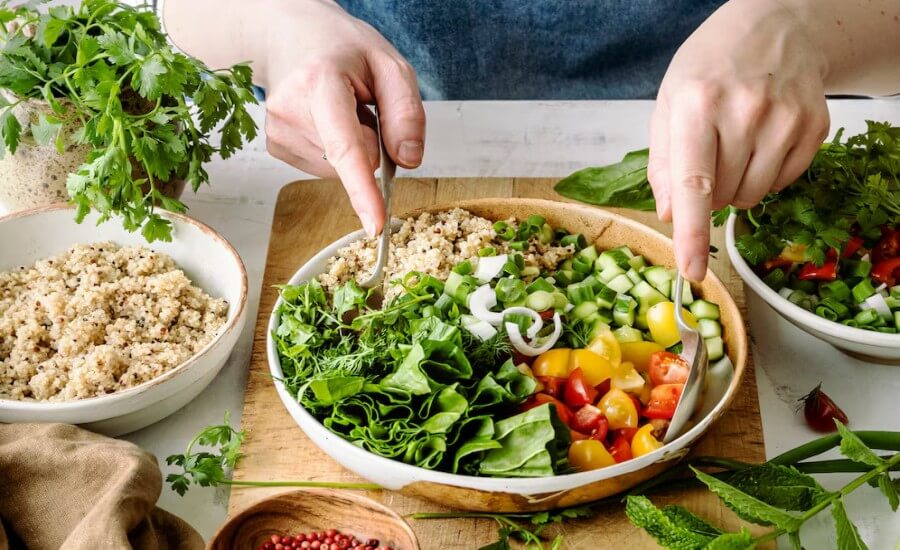Joint pain and arthritis affect millions globally, significantly impacting mobility, independence, and overall quality of life. Conditions like osteoarthritis (OA), often related to wear and tear but involving inflammation, and rheumatoid arthritis (RA), an autoimmune inflammatory disease, can be debilitating. While medical treatments are essential, growing evidence highlights the powerful role of diet, particularly plant-based approaches, in managing symptoms. This analysis explores how a vegan diet may support joint health and offer relief from arthritis pain and stiffness, examining the nutritional mechanisms, ethical considerations, environmental links, and practical experiences associated with this anti-inflammatory way of eating.
Boost Joint Health: Vegan Diet for Arthritis Relief Guide
LENS 1: Nutritional Analysis – Cooling the Fires of Inflammation
From a nutritional perspective, a well-planned vegan diet tackles joint pain and arthritis symptoms primarily by reducing systemic inflammation, a key driver in both OA and RA.
- Antioxidant Army: Colourful fruits and vegetables (berries, leafy greens, beets), nuts, and seeds are packed with antioxidants (Vitamins C & E, carotenoids, polyphenols) that neutralize damaging free radicals contributing to joint inflammation and cartilage breakdown.
- Omega-3 Fatty Acids: Plant sources like flaxseeds, chia seeds, and walnuts provide ALA omega-3s. While beneficial, conversion to the more potent anti-inflammatory forms, EPA and DHA, is often limited. Algal oil supplements provide direct vegan EPA/DHA, strongly recommended for significantly modulating inflammatory pathways (like reducing pro-inflammatory eicosanoids). Vegan diets also naturally eliminate arachidonic acid (an omega-6 fat found in meat and dairy) which can be converted to pro-inflammatory compounds.
- Fiber and Gut Health: High fiber intake from whole plant foods nourishes a healthy gut microbiome. Gut dysbiosis (imbalance) is increasingly linked to systemic inflammation and autoimmune conditions like RA. Fiber promotes beneficial bacteria that produce anti-inflammatory short-chain fatty acids.
- Specific Phytonutrients: Many plant compounds show promise:
- Curcumin (in Turmeric/Haldi, a staple in Indian cuisine): Potent anti-inflammatory effects studied extensively for arthritis.
- Gingerol (in Ginger/Adrak): Also exhibits significant anti-inflammatory and analgesic properties.
- Sulforaphane (in Broccoli, Cabbage): May help protect cartilage.
- Quercetin (in Onions, Apples, Berries): Antioxidant and anti-inflammatory.
- Weight Management: Vegan diets, particularly whole-food based, are often lower in calorie density and higher in fiber, aiding in weight management. Maintaining a healthy weight significantly reduces stress on weight-bearing joints (hips, knees), crucial for managing OA pain.
- Bone Support: While not directly treating arthritis inflammation, ensuring adequate Calcium and Vitamin D (often requires supplementation/fortified foods, especially in regions with limited sun exposure or for those indoors) and Vitamin K (leafy greens) is vital for bone health, which supports joint integrity. Which anti-inflammatory spices like turmeric or ginger could you incorporate more into your cooking?
Nutritional Deep Dive: Omega-3s (EPA/DHA) & Inflammation Modulation
EPA and DHA, the long-chain omega-3s readily available from fatty fish or vegan algal oil, are crucial anti-inflammatory players. They compete with pro-inflammatory omega-6 fatty acids (like arachidonic acid) for incorporation into cell membranes and for enzymatic pathways. When EPA/DHA are present, the body produces less potent inflammatory mediators (like certain prostaglandins and leukotrienes) and more anti-inflammatory mediators called resolvins and protectins, actively helping to resolve inflammation. This makes direct EPA/DHA intake particularly valuable for inflammatory conditions like RA.
Voice of Experience (Rheumatologist): “Lifestyle factors, especially diet, play a significant role in managing arthritis. A whole-food, plant-based diet reduces inflammatory load, supports a healthy weight, and provides antioxidants. While it doesn’t replace necessary medications for many, particularly with RA, it can be a powerful complementary strategy to reduce symptoms, improve function, and potentially lower medication needs under guidance. Consistent intake of Omega-3s (especially EPA/DHA) is often beneficial.” – Dr. Meera Joshi, MD
LENS 2: Ethical Framework – Compassion for Self and Others
Choosing a vegan diet when facing joint pain intertwines ethical considerations for animals with the deeply personal act of self-care and seeking relief from suffering.
- Aligning Values and Well-being: The ethical commitment to reduce animal suffering finds a parallel in the desire to reduce one’s own physical suffering from chronic pain. Adopting a potentially healing diet becomes an act consistent with a broader philosophy of minimizing harm.
- Empowerment Through Choice: Chronic pain can often lead to feelings of helplessness. Actively choosing a dietary strategy believed to be beneficial, rooted in ethical principles, can restore a sense of agency and control over one’s health journey.
- Self-Compassion: Nurturing the body with anti-inflammatory, wholesome foods can be viewed as an act of self-compassion, particularly when facing the challenges of a chronic condition like arthritis. It reframes dietary choices from restriction to nourishment.
- Critiquing Harmful Systems: Recognizing that industrial animal agriculture contributes to both animal suffering and potentially pro-inflammatory diets provides a systemic critique, further motivating the choice for plant-based eating. Does viewing your dietary choices as an act of self-care change your perspective on managing joint health?
Hidden Benefits: Reduced Stress & Pain Perception
Living in alignment with core values can reduce underlying psychological stress. Since stress is known to amplify pain perception and can even trigger inflammatory flare-ups, the mental ease derived from ethical consistency might indirectly contribute to better pain management.
Voice of Experience (Arthritis Patient & Vegan Advocate): “Dealing with RA pain felt overwhelming until I connected my vegan ethics with my health. Choosing foods that didn’t involve animal suffering and might actually reduce my inflammation felt incredibly empowering. It didn’t cure me, but it gave me back a sense of control and definitely improved my symptoms alongside my medication.” – Rohan Patel, Teacher
Critical Reassessment: Avoiding Blame and Oversimplification
It’s vital to avoid suggesting that diet alone can cure severe arthritis or implying that individuals are to blame for their pain if dietary changes aren’t sufficient. Arthritis is complex, often requiring medical intervention. The ethical perspective supports compassionate care, including access to necessary treatments, alongside empowering lifestyle choices.
LENS 3: Environmental Scientist’s Analysis – Planetary Health & Personal Inflammation
While direct causal links are complex, environmental factors influenced by dietary patterns may have indirect relevance to joint health and inflammation.
- Pollution and Systemic Inflammation: Industrial agriculture, particularly large-scale animal farming, contributes to air and water pollution. Exposure to certain environmental pollutants is being researched for potential links to increased systemic inflammation, which could theoretically exacerbate inflammatory conditions like arthritis.
- Resource Efficiency: The plant foods central to an anti-inflammatory vegan diet (fruits, vegetables, legumes, whole grains) generally have a significantly lower environmental footprint (less land, water, emissions) compared to animal products often associated with pro-inflammatory diets.
- Climate Change & Health Stressors: Climate change, driven partly by food systems, can create additional health stressors (heat waves, access disruptions, mental stress) that might indirectly impact chronic conditions like arthritis. Choosing sustainable diets is a mitigating action.
- Healthy Ecosystems, Healthy People: Protecting biodiversity and ecosystem health through sustainable food choices contributes to a healthier overall environment, which forms the foundation for human health and resilience. Could improving the health of our environment contribute, even indirectly, to reducing inflammatory diseases?
Market Transformation Map Suggestion: A graph showing increased consumer interest and sales for vegan Omega-3 (algal oil) supplements and food products fortified with anti-inflammatory ingredients like turmeric or plant sterols.
Voice of Experience (Environmental Health Researcher): “We are increasingly understanding how environmental exposures, including air pollutants and contaminants from industrial agriculture, can contribute to systemic inflammation. While direct links to specific arthritis outcomes need more research, reducing the environmental burden through sustainable diets like plant-based eating is undoubtedly beneficial for overall public health and likely reduces exposure to potential inflammatory triggers.” – Dr. Lena Hanson, Environmental Scientist
LENS 4: Everyday Practitioner’s Experience – Moving Towards Relief
Individuals with joint pain or arthritis who adopt a vegan diet often share stories of reduced symptoms and improved quality of life, alongside practical learnings.
- Symptom Improvement Reports: Many report noticeable reductions in joint pain, morning stiffness, and swelling, sometimes leading to increased mobility and reduced reliance on pain medication (always under medical supervision). Benefits are often more pronounced with whole-food approaches.
- Anti-Inflammatory Eating in Practice: Practitioners learn to consistently incorporate key foods: using turmeric and ginger generously in cooking (common in Indian cuisine!), eating berries regularly, prioritizing leafy greens, consuming nuts/seeds, and ensuring adequate omega-3 intake (often including algal oil).
- Consistency is Key: Benefits are usually not immediate. Practitioners emphasize the need for consistency over weeks or months to experience significant changes in inflammation and symptoms.
- Weight Management Impact: For those with OA, particularly in knees or hips, weight loss achieved through a vegan diet is frequently cited as a major factor in pain reduction.
- Holistic Approach: Diet is often combined with other beneficial practices like gentle, joint-friendly exercise (yoga, swimming, cycling), physical therapy, stress management, and adequate sleep for best results.
- Challenges: Navigating eating out, ensuring adequate intake of specific nutrients (B12, Vit D, Calcium, Omega-3s), and avoiding processed vegan foods that might hinder progress are common hurdles. What practical step could you take today to make your next meal more anti-inflammatory?
Daily Impact: An Anti-Inflammatory Vegan Day (Indian Inspired)
- Breakfast: Besan Cheela (chickpea flour pancake) with grated ginger and chopped coriander, served with mint chutney. (Protein, Fiber, Gingerol).
- Lunch: Rajma (kidney bean curry) cooked with onions, tomatoes, ginger, garlic, and turmeric, served with brown rice and a side salad. (Soluble Fiber, Protein, Curcumin, Antioxidants).
- Dinner: Palak Tofu (spinach and tofu curry) with whole wheat roti. (Iron, Calcium, Protein, Folate, Antioxidants).
- Snacks: Handful of almonds and walnuts (Healthy fats, Vit E, Omega-3 ALA), bowl of berries (Antioxidants).
- Beverage: Warm water with lemon, or turmeric milk (Haldi Doodh) made with fortified plant milk and black pepper (enhances curcumin absorption).
- Supplement: B12, Vitamin D, Algal Oil (EPA/DHA).
Voice of Experience (Person with Osteoarthritis): “My knee pain was making walking difficult. Switching to a whole-food vegan diet, along with losing some weight, made a world of difference. I focused on adding lots of vegetables, beans, and spices like turmeric daily. The pain isn’t gone completely, but it’s significantly less, and I move much more freely.” – Mrs. Geeta Sharma, Retired School Principal
Alternative Approaches: Beyond the Basics
For some, especially with autoimmune RA, more specific approaches under professional guidance might be explored, such as elimination diets to identify specific trigger foods, or protocols focusing intensely on gut health restoration alongside a plant-based foundation.
PERSPECTIVE INTERSECTION MATRIX
- Nutrition & Practice: Scientific understanding of anti-inflammatory foods (Lens 1) guides practitioners’ choices (Lens 4), leading to reported symptom reduction (Lens 4) that supports the science (Lens 1).
- Ethics & Self-Care: Ethical motivations (Lens 2) can drive the adoption of a diet (Lens 1, 4) seen as an act of self-care (Lens 2) for managing pain (Lens 4).
- Environment & Health Choices: Choosing sustainable diets (Lens 3) aligns with anti-inflammatory eating patterns (Lens 1), offering dual benefits recognized by practitioners (Lens 4).
- Practice & Challenges: Practical challenges (Lens 4) in maintaining an anti-inflammatory vegan diet require nutritional knowledge (Lens 1) and may be overcome by strong ethical or health motivations (Lens 2).
- Inflammation Science & All Lenses: The central role of inflammation (Lens 1) connects nutritional strategies, potential environmental triggers (Lens 3), patient experiences (Lens 4), and even the stress component influenced by ethics (Lens 2).
MISCONCEPTION ANALYSIS
| Misconception | Reality |
| Vegan diets lack Calcium & Vitamin D needed for strong bones/joints. | Well-planned vegan diets can provide adequate Calcium (leafy greens, fortified foods, tofu, sesame seeds). Vitamin D often requires fortified foods or supplements for everyone, regardless of diet. Both are crucial. |
| You need animal collagen (e.g., bone broth) for joint health. | Collagen is a protein broken down during digestion. Your body builds its own collagen using amino acids (abundant in varied vegan diets) and Vitamin C (plentiful in fruits/veg). Bone broth’s benefits for joints are largely unproven. |
| Arthritis is just inevitable ‘wear and tear’; diet can’t help much. | Inflammation is a key component in both OA and RA. Diet profoundly influences systemic inflammation. While not a cure, it can significantly impact symptoms, disease progression (potentially), and quality of life. |
| Simply going vegan automatically reduces joint pain/inflammation. | A diet of processed vegan junk food can be pro-inflammatory. Benefits come from a whole-food vegan diet rich in anti-inflammatory compounds and low in processed ingredients, unhealthy fats, and refined sugars. |
| Plant-based diets don’t provide enough protein for tissue repair. | Legumes, tofu, tempeh, nuts, seeds, and whole grains offer ample protein for bodily needs, including tissue maintenance and repair, when consumed in adequate variety and quantity. |
KEY TURNING POINTS
- Identification of Inflammatory Cytokines: Discovering key inflammatory molecules (like TNF-alpha, IL-6) involved in arthritis pathogenesis, opening doors for targeted therapies (drugs and potentially dietary modulation).
- Research Linking Diet to RA/OA: Studies showing correlations between dietary patterns (e.g., Western diet vs. Mediterranean/plant-based) and arthritis risk/severity.
- Focus on Gut Microbiome: Understanding the link between gut health, systemic inflammation, and autoimmunity, highlighting the importance of dietary fiber.
- Studies on Specific Plant Compounds: Research isolating and studying the effects of curcumin, gingerols, omega-3s, etc., on inflammatory pathways relevant to arthritis.
- Patient Empowerment & Lifestyle Medicine: Growing movement emphasizing patient agency and the role of lifestyle interventions (diet, exercise) alongside conventional medicine in managing chronic diseases like arthritis.
SYNTHESIS & RECOMMENDATIONS
A well-planned, whole-food vegan diet holds significant promise as a powerful strategy for supporting joint health and managing arthritis symptoms. Its strength lies in combating systemic inflammation through a high intake of antioxidants, beneficial phytonutrients (like curcumin and gingerol), fiber supporting gut health, and healthy fats, while eliminating dietary cholesterol and reducing inflammatory triggers common in animal products. Combined with potential benefits from weight management, it offers a multifaceted approach to reducing pain, stiffness, and improving mobility. While not a substitute for necessary medical care, it’s a potent, evidence-informed complementary approach. Careful attention to B12, Vitamin D, Calcium, and crucially, direct EPA/DHA intake (via algal oil) is important for optimal results.
Recommendations:
- Flood Your Diet with Plants: Maximize intake of colourful fruits, vegetables (especially leafy greens and cruciferous), legumes, and whole grains.
- Embrace Anti-Inflammatory Spices: Use turmeric (with black pepper), ginger, garlic, and other herbs/spices generously.
- Prioritize Healthy Fats: Include nuts, seeds (flax, chia, hemp), avocado, and consider an Algal Oil supplement for potent EPA/DHA.
- Focus on Fiber: Ensure high fiber intake from whole plant foods to support gut health.
- Maintain a Healthy Weight: Utilize the lower calorie density of plant foods if weight loss would benefit your joints.
- Ensure Key Nutrients: Pay close attention to reliable sources of B12, Vitamin D, and Calcium.
- Combine with Movement: Integrate gentle, joint-friendly exercise as advised by your healthcare provider.
- Work with Professionals: Discuss dietary changes with your doctor or a registered dietitian knowledgeable about arthritis management.
FURTHER AREAS OF EXPLORATION
- Specific Diets for Rheumatoid Arthritis (e.g., Autoimmune Protocol variations within veganism)
- The Role of Nightshades (Tomatoes, Peppers) in Arthritis: Myth vs. Reality
- Vegan Sources of Glucosamine & Chondroitin (and evidence for their use)
- Combining Vegan Diet with Mind-Body Practices (Yoga, Tai Chi) for Arthritis
- Impact of Hydration on Joint Health and Cartilage
- Traditional Ayurvedic Approaches (often plant-based) to Joint Pain in India












